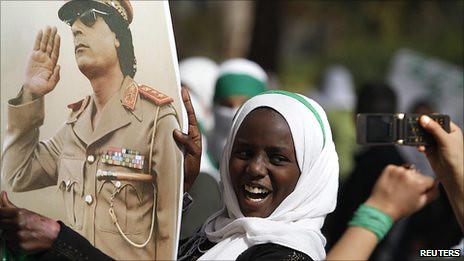
Demonstration in support of the military effort to defeat a counter-revolutionary rebellion in the North African state of Libya. The Gaddafi government is under attack by the imperialist states, including the U.S. a photo by Pan-African News Wire File Photos on Flickr.
Turmoil in Libya worsens as West launches attack
Last Updated(Beijing Time)
2011-03-21 06:58
The joint forces of several Western nations Saturday launched an attack on Libya, a move that will complicate an already turbulent situation in the North African country.
French warplanes had been taking the lead in the airstrikes, which came after the UN Security Council imposed a no-fly zone over Libya.
At least 64 people were killed and 150 others wounded following the military operation against Libyan leader Muammar Gaddafi, launched by the coalition that included the United States, France, Britain, Canada and Italy.
The western coalition claimed they launched the assault for humanitarian interests. But many analysts and media believed they did it for the sake of their own goals and interests instead of the safety and welfare of the unarmed Libyan civilians as they have claimed.
AN INTERVENTION WITH DIFFERENT GOALS
French President Nicolas Sarkozy has taken a leading role in pushing for international intervention in Libya.
With a record-low popularity and facing a presidential election next year, Sarkozy was eager to take the reins in global crises and show voters that he can take the lead.
Gaddafi, then, offers Sarkozy an opportunity.
About a week ago, the French leader became the first world leader to recognize the Libyan rebel National Libyan Council as "legitimate representative" of Tripoli.
He also took the lead in plans to enforce a no-fly zone over Libya
At the Paris summit Saturday, Sarkozy announced that French planes were already in the air and ready to attack when other participants barely reached an agreement.
After the emergency summit, Sarkozy said France had already taken military actions against Libya.
"For the moment and already, our planes are over the city preventing air attacks," he said at a press conference.
"Our determination is total," the president declared after seeing off important decision-makers from some Arab countries and main Western powers to agree on a military action against Libya.
After the summit, Belgian Prime Minister Yves Leterme told reporters that France was obviously "heading" the military operation against Libya.
British Prime Minister David Cameron led the campaign for military operation against Libya together with Sarkozy. For a young leader who is dealing with his first major international crisis, this is a good opportunity to prove his leadership and build his stature on the global stage.
Then why did the United States, which showed reluctancy to wade into another Middle East military operation at first, finally decided to intervene?
Analysts believed the rapidly-evolving political situation in Libya is one of the factors that prompted Washington to shift its military and foreign policies.
The United States, which hasn't gotten out of the mire in Iraq and Afghanistan, had feared that its involvement in the military effort would be regarded as a U.S. declaration of war against the whole Muslim world.
But those concerns were soon dispelled as the Arab League voiced support for the idea of a no-fly zone over Libya, and Libyan rebel forces have meanwhile suffered fresh setbacks when the country's pro-government forces entered the opposition stronghold of Benghazi.
Though western powers launched their attack on Libya out of different motives, analysts and observers said they simply shared a common goal: to overthrow the Gaddafi regime and grab the rich oil reserves of Libya.
Russia's Envoy to NATO, Dmitry Rogozin, told Russia Today TV channel that certain countries are pushing to get involved in Libya because they are reliant on its oil resources.
"If Libya were just a banana-growing country, there wouldn't be so much interest in its domestic situation, including the humanitarian sphere," Rogozin said.
"The West so far has been playing games for its own consumption. They hold meetings with all sorts of people, trying to invest in their powers, but that has nothing to do with the agenda of stabilizing the situation in that North African country," said the NATO envoy.
Observers and analysts also warned that the joint military operation doesn't necessarily lead to the step-down of Gaddafi. Instead, it could worsen the already turbulent situation of that nation.
Moreover, it could plunge the nation into a state of chaos and anarchy and result in a humanitarian disaster and the empowerment of extremists, they said.
Therefore, if the military efforts against the North African country were to become a protracted campaign, leaders of the Western nations involved in the military operation would all suffer politically, they said.
No comments:
Post a Comment